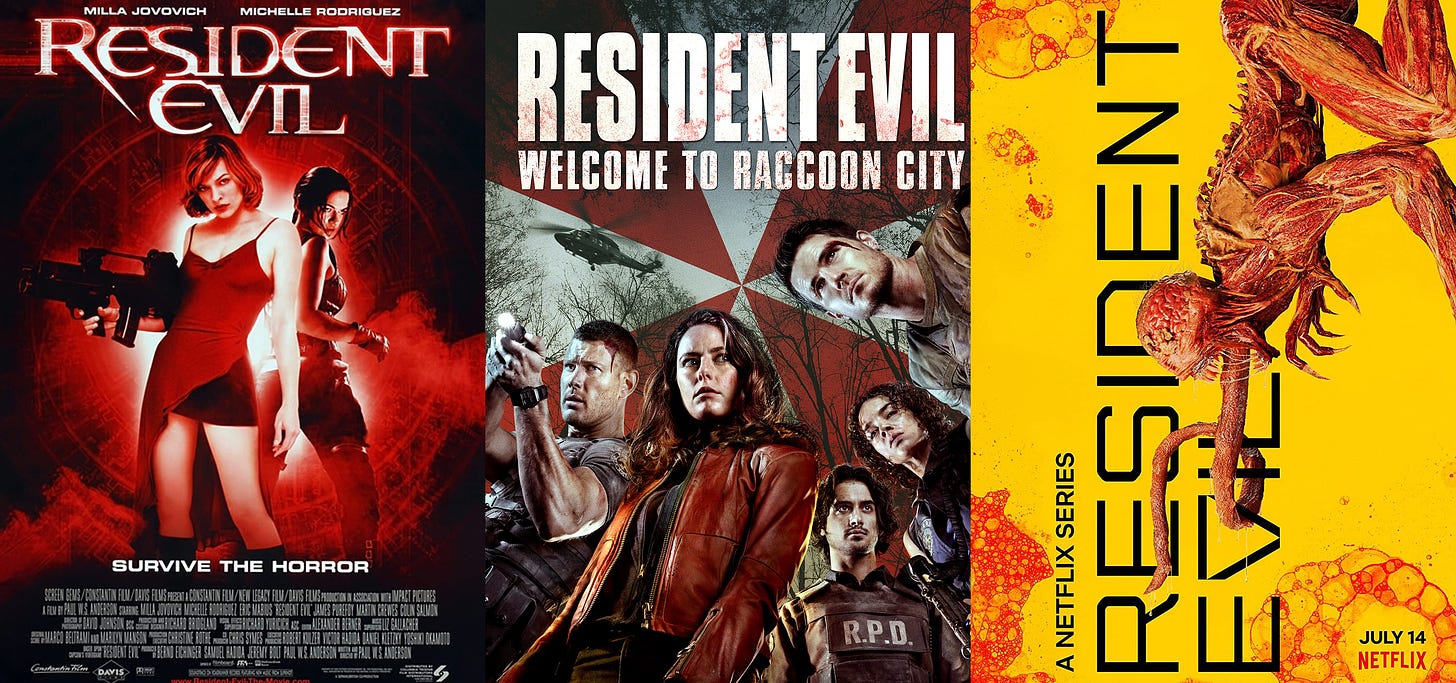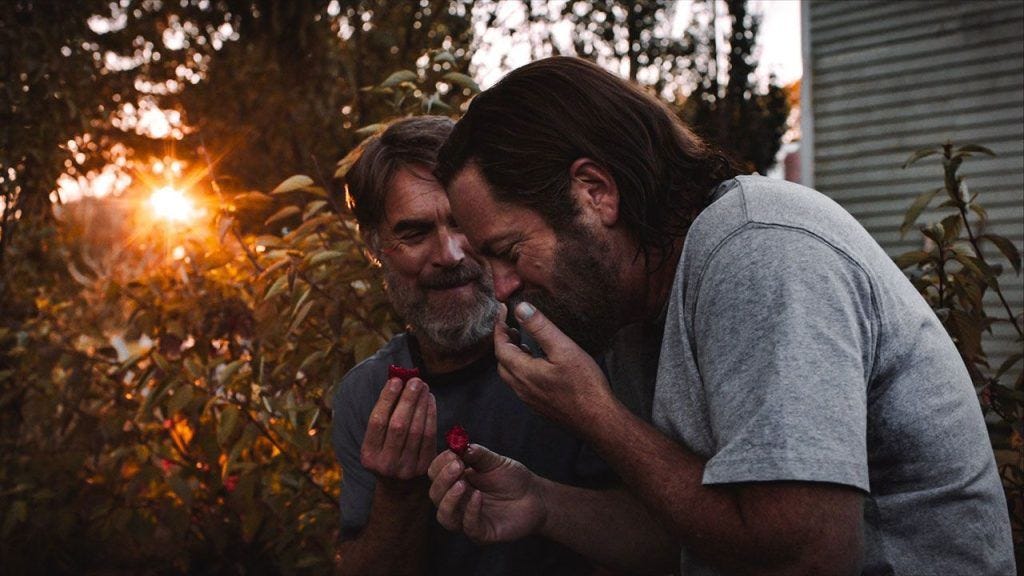Dear hopeful reader,
If there’s a video game franchise that has been adapted the most to live-action, it’s the Resident Evil series. And all these adaptations are missing something crucial—the heart of Resident Evil. The fear. The courage over fear. The tension. The cringey dialogue to lighten the tension. The adrenal rush. The unknown. The exploration. The lack of resources. The resourcefulness. The gore. The cheese. The survival horror.
George A. Romero (RIP), the king of zombie films, had the right mindset when he was set to adapt the first Resident Evil movie for Constantin Film. His version was going to be gory, confined, slow-burning. While he made some divergences in the script from the first game, he still wanted to be as faithful to the source material as possible. And he was going to focus on exploring Raccoon City and character relations to properly build the world of RE.
Alas, while Capcom loved Romero’s commercial for RE2, they didn’t like his script for the full-length adaptation, even after numerous rewrites. Even if it was on paper Resident Evil incarnate. We still don’t exactly know why, but perhaps the upcoming documentary will shed some light on what happened then.
Paul W. S. Anderson ended up directing the first live-action, which released in 2002. Anderson’s The Undead was reworked and renamed as Resident Evil. That may explain why it doesn’t follow the story organically.
Yet of all the movies and shows released over the years, this one may be my most favorite. It sets the scene in a mysterious way in an empty, large, haunting mansion which so happens to be connected to a deep underground laboratory. The lab is infested with the undead, cerberuses, and lickers. There is slow build-up at first, and tension. A lot of action. A lot of stupid actions. It’s a fun watch. I always come back to it when I feel nostalgic and silly and want to see Milla Jovovich and Michelle Rodriguez kick some zombie butt.
Johannes Roberts’ Resident Evil: Welcome to Raccoon City is on the surface the most faithful to the first two games—the sets, the storylines, the characters, the monsters, the lore. However, the short film feels crammed exploring two stories that deserve time to unravel. The protagonists’ personalities don’t match, especially Leon Kennedy. While Kennedy is a rookie in the second game, he’s not helpless and pathetic like in the movie. Albert Wesker as a villain isn’t compelling because he’s now a pawn of a bigger machine. Lisa Trevor was made good. While her arc is heartbreaking in RE1; make no mistake, she’s an antagonist. Even the sets look cheap. It’s disconcerting to know that some of the actors weren’t passionate about the games. No wonder they weren’t able to personify the iconic characters. Although the lackluster dialogue didn’t help.
Imaginably, Roberts had certain limitations to deal with when filming his movie during the pandemic. So it’s understandable the movie didn’t live up to the expectations after its release. Still, I have seen fan-made films that look better. One great example is Resident Evil: Falling Stars by Mariano Caterinozzi. You can clearly see how much love and passion went into this project, with RE fandom in mind. And right away, it’s obvious who Albert Wesker is. The voice and demeanor are on point.
Also read: The Last of Us DLC does narrative better
The now canceled Resident Evil show by Andrew Dabb is a complete deviation from the games. You could say it’s an alternate reality of the RE universe. Raccoon City is now New Raccoon City located somewhere in South Africa, rebuilt by Umbrella Corporation at the center of it. Albert Wesker is a devoted father of two surrogate ‘twin’ daughters, Jade and Billie, working for Umbrella. Wesker is Wesker and also not—he’s a clone. A lot of time is spent on the family dynamics of the Weskers. The story also switches between the New Raccoon City in 2022 and post-outbreak London in 2036, with Jade as the focal character of the show.
I commend Dabb for taking a risk and deviating from the main story. It takes courage and initiative to try something different, despite the risk of failure. Yet the show wasn’t well-received. The confusion lies in for whom it was made. As The Critical Drinker so eloquently put, “The kind of people who actually find teenage dramas interesting are gonna check out the moment the zombies show up. And the people who just want zombies and action and guns are gonna be bored out of their minds by all the teenage angsty stuff.”
I believe these directors believed in their work. I believe they love the game franchise. I believe they worked hard to adapt their projects to live-action. But I think they don’t necessarily understand the RE fandom and target audience. Maybe they made their adaptations for themselves and/or for the mainstream, but certainly not for the fans. When you make something for everyone, you make it for no one, as the low ratings for the Resident Evil show indicate.
Uncharted by Allan Ungar, starring Nathan Fillion, perfectly exemplifies a live-action short made by fans for fans. Fillion is Drake, physically and personality-wise. I get goose bumps every time his face is first revealed in the film. There’s the tension-alleviating jokes we’re used to. The rich world building with astute expositions. The fast-paced action. The exploration for historical valuables. The sneaking around, the getting away, the figuring out. The sense of adventure. The spirit of Uncharted is there through and through.
Deviations in adaptations are forgiven and even welcome when they’re done right. For instance, the third episode of the new TV series The Last of Us titled “Long, Long Time” follows Bill and Frank’s relationship over the course of twenty years. In the game, we don’t know much about these characters, except that they had an unstable relationship, to the point of hatred. There wasn’t much to work with from the source material.
But what we got out of “Long, Long Time” is something beautiful, hopeful, tender. Although it ended in Bill and Frank drifting off to sleep forever, there was temporary respite from the dismal, dreadful world of The Last of Us. For as long as they lasted, there was hope, a core theme of the first game. Their fate became an impactful turning point for Joel and Ellie’s relationship, something that wasn’t as obviously portrayed in TLOU Part I with Joel, Ellie, and Bill’s interactions. Everything moved along as it should have in the show, not impeding the overall plot, objectives, and motivations. The episode is exquisite. It stays with you long after it’s done.
People can say that adapting video games to live-action is hard. Survival horror elements are lost in adaptation as the players who now become viewers no longer have agency over the character they were able to control in a game. And the gameplay and atmosphere are more difficult to reproduce in another medium. But then, TLOU was adapted as an HBO show with a score of 9.2 on IMDB and 97% on Rotten Tomatoes so far. That tells me the individuals behind it have an understanding of and passion for the project. They know how to make it work on TV without losing the essential. If the viewership rating is any indication, they even understand the target audience.
Maybe the future is fan-made films and shows. And by people who care about a particular franchise and fandom and are invested in creating quality adaptations. There may be hope for another Resident Evil film or show.
Do you think we’ll ever get a deserving Resident Evil adaptation? Or should we forget about it? I would love to hear your thoughts.
Yours hopefully,
Nadia






